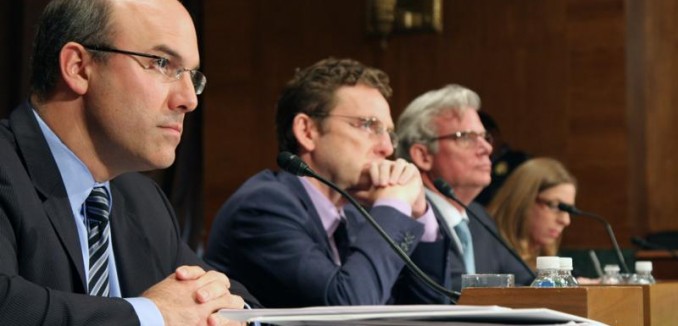Sanctions and national security experts urged the United States to reject Iran’s demands for further economic concessions and ramp up pressure on Tehran in response to its regional aggression during a Senate Banking Committee hearing on Tuesday.
Iranian leaders have complained of not receiving enough sanctions relief, blaming the U.S. for the continued hesitancy of financial institutions to resume business with the Islamic Republic. In response, Secretary of State John Kerry has traveled to Europe to convince non-U.S. banks and companies to do business with Iran, and the Obama administration is considering granting Iran indirect access to US dollars in financial transactions.
However, Juan Zarate, former deputy assistant to the president and deputy national security adviser, argued in his prepared testimony (.pdf) that the U.S. should not try to “rehabilitate” the Iranian regime, but rather, “the onus should remain solely on Iran to alleviate concerns about its activities, lack of transparency, and failure to meet heightened global standards of financial integrity.”
Because Iran remains a primary money laundering concern and continues to finance terrorism, Zarate added, “The promotion of banking in any commercial activity in that environment is completely anathema to the message that the US government has been sending internationally for the last 15 years.”
Mark Dubowitz, the executive director of the Foundation for Defense of Democracies, also noted in his testimony (.pdf) that the U.S. has already fulfilled its side of the deal, having lifted or suspended nuclear-related sanctions and granted Iran access to $100 billion in frozen assets. “Easing dollarized transaction restrictions also aids an Iranian push to legitimize its financial sector without halting the terror, nuclear, and missile financing, not to mention the money-laundering and sanctions evasion that violate international norms of responsible financial activities,” he argued.
Experts and lawmakers have also called for increased pressure on Iran to exact a price for its ballistic missile tests, support for terrorism, and human rights abuses. Both Dubowitz and Center for New American Security Senior Fellow Elizabeth Rosenberg recommended sanctioning the Iran’s Islamic Revolutionary Guard Corps under terrorism authorities. According to Dubowitz, no individuals or entities linked to human rights abuses have been designated since the deal was reached last July.
At a hearing on Wednesday, Rep. David Cicilline (D-RI) also raised the issue of taking action against Iran’s human rights abuses, remarking that there has been an increase in human rights violations in Iran since the deal was reached. He noted that in persuading some to vote in favor of the deal, the Obama administration assured Congress that it would allow the U.S. to push back hard against Iran in these other (non-nuclear) areas.
In urging the imposition of additional sanctions on Iran, Senator Bob Menendez (D-NJ) said at Tuesday’s hearing, “I hear many of my colleagues say we should keep Iran’s feet to fire, but if there’s no fire, how do you keep their feet to it?”
[Photo: U.S. Senate Committee on Banking, Housing, and Urban Affairs]




